Probably you are asking for the serial number of the corresponding row If you order them by u_id ascending.
If so here's the query:
SELECT
u_id,
uname,
@a := @a + 1 SL
FROM
user, (SELECT @a := 0) serial
ORDER BY u_id ASC
Here's the sample output :

CAUTION: You may get different position number if you sort them based on other field. Since your question gave me a hint that the data are ordered based on u_id ascending so this query suits.
Again if you want the position number of your data based on uname field (ascending) the query might look like following:
SELECT
u_id,
uname,
@a := @a + 1 SL
FROM
user, (SELECT @a := 0) serial
ORDER BY uname ASC
And sample output would look like:

N:B: Position of the records may also change if new records are inserted.

